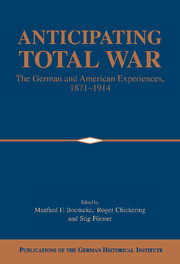Book contents
- Frontmatter
- Introduction
- Part One Germany, The United States, and Total War
- Part Two War and Society
- Part Three Memory and Anticipation: War and Culture
- 11 The American Debate over Modern War, 1871-1914
- 12 Whose War? Whose Nation?: Tensions in the Memory of the Franco-German War of 1870-1871
- 13 War Preparations and National Identity in Imperial Germany
- 14 Military Imagination in the United States, 1815-1917
- 15 Dreams and Nightmares: German Military Leadership and the Images of Future Warfare, 1871-1914
- 16 “A Calamity to Civilization”: Theodore Roosevelt and the Danger of War in Europe
- Part Four The Experience of War
- Index
13 - War Preparations and National Identity in Imperial Germany
Published online by Cambridge University Press: 05 January 2013
- Frontmatter
- Introduction
- Part One Germany, The United States, and Total War
- Part Two War and Society
- Part Three Memory and Anticipation: War and Culture
- 11 The American Debate over Modern War, 1871-1914
- 12 Whose War? Whose Nation?: Tensions in the Memory of the Franco-German War of 1870-1871
- 13 War Preparations and National Identity in Imperial Germany
- 14 Military Imagination in the United States, 1815-1917
- 15 Dreams and Nightmares: German Military Leadership and the Images of Future Warfare, 1871-1914
- 16 “A Calamity to Civilization”: Theodore Roosevelt and the Danger of War in Europe
- Part Four The Experience of War
- Index
Summary
This chapter addresses the questions of how far a link can be established between the armaments policies of the Bismarckian empire of 1871 and efforts to create a unified nation, and how far the identification with that nation was reflected in Imperial Germany's preparations for war. It is concerned with the impact of what has been called Rüstungsnationalismus (arms-based nationalism) on society and politics before 1914.
Although the liberals of central Europe had worked quite hard in the decades prior to the founding of the German Empire to generate a German national consciousness based on a common language, historical and cultural experiences, and geography, they still were far from having achieved widespread popular identification with a German nation-state when Otto von Bismarck succeeded in uniting Germany under Prussian leadership in 1871. However one may judge his achievements, no one was more aware than the first Reich chancellor himself that much still had to be done to bring about a solid identification with the new Reich among the 40 million people who now lived within its borders.
- Type
- Chapter
- Information
- Anticipating Total WarThe German and American Experiences, 1871–1914, pp. 307 - 326Publisher: Cambridge University PressPrint publication year: 1999

